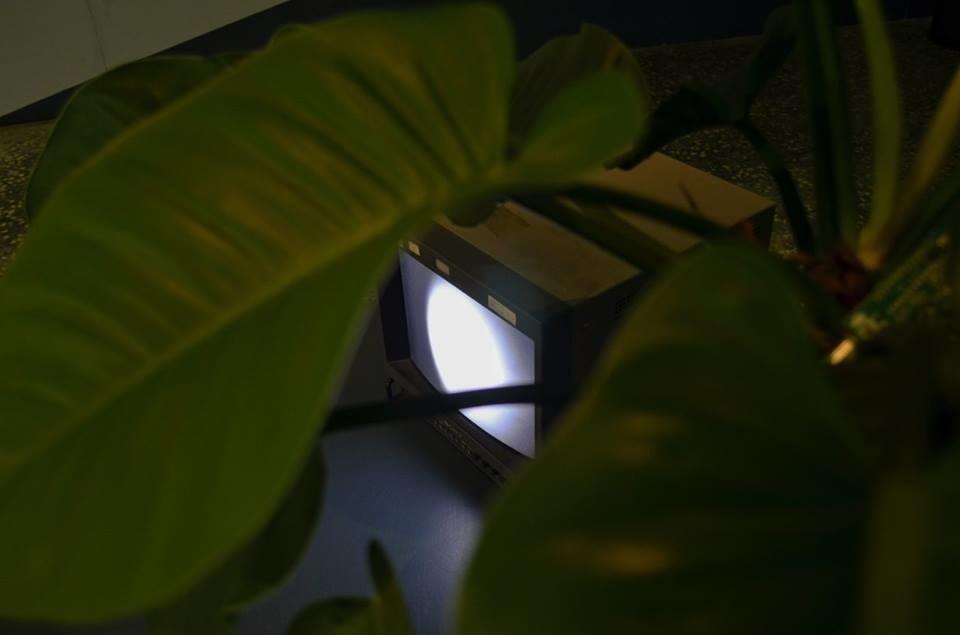
Moon Tides
Plant, Sensors, Experimental Music
2017
Plant, Sensors, Experimental Music
2017
“Moon Tides” is a multi-part project that explores the persistance for life in a plant and human. What is the drive that motivates us to prosper, to bloom, to preservere in this life of becoming? How can we sonically interpret this striving as a score of our lives?
The idea of transbody is explored in Moon Tides I: Sonic Union, a ritualistic performance in which a plant and a human are united in a shared narrative of vulnerability and weakness. Internal sounds from the human and plant, such as breathing, digestion, breaking bones and branches and electromagnetic bio-feedback are used in a musical experience to create one sonic field of bio-rhythms.
In this performance, the narrative of vulnerability and sadness reflects upon a general correlation between power and emotions. How does the energy of life embody a certain affective politics based on our vision of life affirming goodnesses? According to Spinoza, Joy and sadness are considered two poles of the emotional scale that determine the range of the vital melodic line; joy increases one’s power to act and persist in life; sadness diminishes one’s level of power.
“Let us begin with a general mythology of sound. Imagine the most elemental technology in the world--the essence of life--the animating power that runs through all living things. This power is an intangible material with universal potential that suggests a shared disposition between all that appears to be separate. Like wind, it flows through different internal and external worlds, making the inner and outer one of the same. The ability for this power to connect different entities, spaces, and time gives it a narrating quality, bringing together different relations, changes and patterns to assemble a perspective of the world that differs from histories based on externality.” --Excerpt from Cosmopolitics of Sounds (2018)
The idea of transbody is explored in Moon Tides I: Sonic Union, a ritualistic performance in which a plant and a human are united in a shared narrative of vulnerability and weakness. Internal sounds from the human and plant, such as breathing, digestion, breaking bones and branches and electromagnetic bio-feedback are used in a musical experience to create one sonic field of bio-rhythms.
In this performance, the narrative of vulnerability and sadness reflects upon a general correlation between power and emotions. How does the energy of life embody a certain affective politics based on our vision of life affirming goodnesses? According to Spinoza, Joy and sadness are considered two poles of the emotional scale that determine the range of the vital melodic line; joy increases one’s power to act and persist in life; sadness diminishes one’s level of power.
“Let us begin with a general mythology of sound. Imagine the most elemental technology in the world--the essence of life--the animating power that runs through all living things. This power is an intangible material with universal potential that suggests a shared disposition between all that appears to be separate. Like wind, it flows through different internal and external worlds, making the inner and outer one of the same. The ability for this power to connect different entities, spaces, and time gives it a narrating quality, bringing together different relations, changes and patterns to assemble a perspective of the world that differs from histories based on externality.” --Excerpt from Cosmopolitics of Sounds (2018)


月潮
植物、感測器、實驗音樂
2017
植物、感測器、實驗音樂
2017
〈月潮〉以聲音表演的形式去探測超身體這個概念。這是一個儀式性的創作,結合植物和人類有關脆弱和悲傷的生命敘述。表演中用到來自人類和植物體內的內部聲音,例如:呼吸、消化、骨頭和樹枝的斷裂,以及植物的電磁反饋,創建一個生物節律的音場。
此作品試圖探問情緒的倫理,作品中描繪的生命能量是一種受情緒彈奏的內力。情緒為來自一種心靈的激情,喜樂和悲傷被視為情感尺度的兩極,決定生命旋律所遊走的範圍。斯賓諾莎說,快樂能增加一個人的行動力和對生命的堅持;悲傷則降低一個人的行動力和社會權力。這個說法是一個方便的自我方針,但似乎將願景侷限於有正負之分的時空。想像時空是無止盡蔓延的,所有方向都是一種前進。脆弱能驅動內在的潛在能量,在印度科學家伯斯(Jagdish Chandra Bose)對植物的研究中,發現適當的刺激可以促進植物的內在壓力,讓樹液更快傳送到成長的區塊。這種內流增長似乎印證生命中的陰性潛能,發動療癒、成長、綻放,這些肯定生命的跡象。
此作品試圖探問情緒的倫理,作品中描繪的生命能量是一種受情緒彈奏的內力。情緒為來自一種心靈的激情,喜樂和悲傷被視為情感尺度的兩極,決定生命旋律所遊走的範圍。斯賓諾莎說,快樂能增加一個人的行動力和對生命的堅持;悲傷則降低一個人的行動力和社會權力。這個說法是一個方便的自我方針,但似乎將願景侷限於有正負之分的時空。想像時空是無止盡蔓延的,所有方向都是一種前進。脆弱能驅動內在的潛在能量,在印度科學家伯斯(Jagdish Chandra Bose)對植物的研究中,發現適當的刺激可以促進植物的內在壓力,讓樹液更快傳送到成長的區塊。這種內流增長似乎印證生命中的陰性潛能,發動療癒、成長、綻放,這些肯定生命的跡象。
